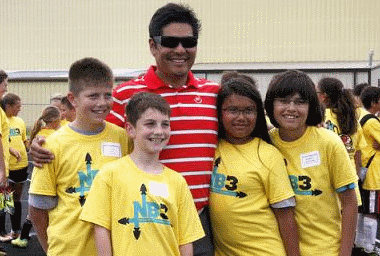
Source: Native News Network
ALBUQUERQUE – The Notah Begay III Foundation, NB3F, has announced it will launch a new initiative to expand its fight against childhood obesity and type 2 diabetes for American Indian children.
This announcement, which includes plans to lead extensive research and advocacy initiatives while assisting more American Indian communities in developing their own evidence-based health and wellness programs, was made possible through a generous $1.5 million grant to NB3F by the Robert Wood Johnson Foundation, one of the nation’s largest health foundations.
“This is a transformative time for the Notah Begay III Foundation. It’s the next step in realizing our vision to empower Native American children nationwide to achieve their potential as tomorrow’s leaders,”
said four time PGA Tour winner, NBC/Golf Channel analyst and NB3F founder, Notah Begay III – Navajo/San Felipe Pueblo.
“Childhood obesity and type 2 diabetes are epidemics in Native American communities. Until we invest the appropriate resources to turn the tide against these preventable diseases, they will continue to overwhelm our communities. There is still much more work to be done but, with the help of the great people at the Robert Wood Johnson Foundation and the ongoing support of all our partners and donors, we’ve taken a very important step toward accomplishing our mission.”
The Notah Begay III Foundation’s new national initiative will be focused on investment in research, grantmaking, technical assistance and advocacy for American Indian communities in three regions of the country – the Southwest (New Mexico, Arizona), the Upper Midwest (Minnesota, Wisconsin) and; the Southern Plains (Oklahoma, Texas).
In addition to equipping more Native American communities with resources and training to address this health crisis through innovative, community-driven, culturally appropriate and multi-faceted programs on a local level, this expanded effort will provide unprecedented funding for research into childhood obesity and type 2 diabetes among American Indian children.
Currently, there is no clearinghouse of data on the topic, which impedes work to fully understand these health issues and the best prevention strategies to effectively combat them. By generating detailed research data and advocating on a national level to reinforce the incredible need for additional resources, NB3F will elevate the issue in the hopes of reaching even more communities in the future.
“There’s a tremendous need for more research, advocacy and local assistance to help Native American children lead healthy lives,”
said Jasmine Hall Ratliff, program officer for the Robert Wood Johnson Foundation.
“It’s become clear in recent years that this work needs to happen now to ensure that Native American children grow into the leaders their communities need. We look forward to working with NB3F as it launches this new national initiative.”
The need for investment in this cause continues to grow.
While childhood obesity rates across the nation are showing positive signs of improvement, they are moving in the opposite direction in many Native communities, some of which have childhood obesity rates exceeding 60 percent. That alarming rate also indicates accelerated incidences of type 2 diabetes, which is often caused by obesity. Current trends indicate one-in-two Native American children will develop type 2 diabetes, a rate higher than all other ethnicities combined. Native Americans are twice as likely as Caucasians to die from diabetes.
These disparities between national averages and those among Native Americans points directly to the relative lack of resources committed to these issues in Native American communities. Statistics indicate that investments in awareness and prevention, especially among children, deliver strong return on investment and save significant public healthcare costs long-term.
For more information about NB3F, its work in Native communities and the continued need for support, visit www.nb3foundation.org.
